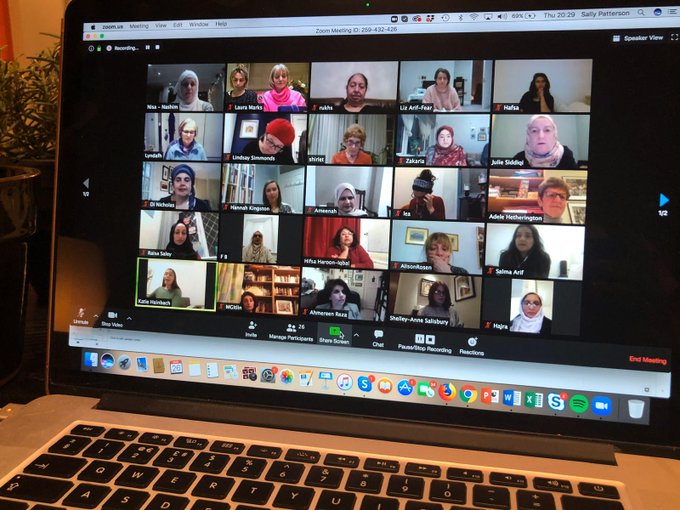Category Archives: Uncategorised
Mitzvah Day Celebrated in Borehamwood & Bushey – 15 Nov 2020
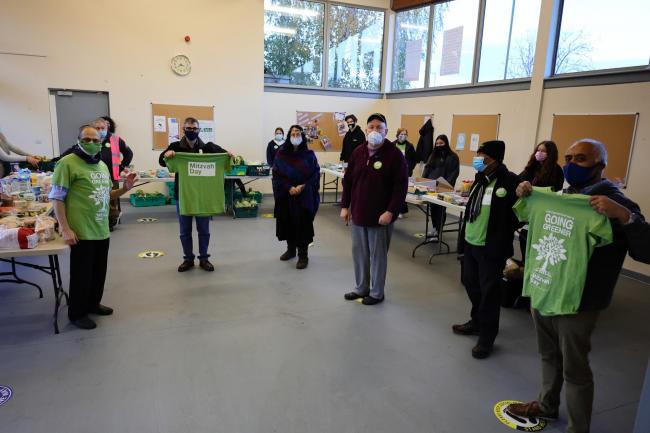
Faith leaders, schoolchildren, parents, a charity, a Jewish youth group and supportive members of the public came together in a display of unity at the weekend.
Mitzvah Day, a Jewish-led day of social action, was marked differently this year because of the pandemic.
But volunteers and guests were still able to carry out charitable and community-led activities on Sunday across Borehamwood and Bushey, with the theme of ‘Food Brings us Together’ and ‘Celebrating Diversity’.
As part of the day, a video was streamed live in which messages of peace and friendship were shared by faith leaders from Hertsmere’s Christian, Jewish, Hari Krishna and Muslim communities, together with the coordinators of Gratitude – a charity which supplies food and other goods to people in need.
The video also featured drawings from schoolchildren, at Yavneh Primary School and Yavneh College in Borehamwood, as well as welcoming the Muslim community to their new mosque in Maxwell Road, Borehamwood.
Over at Hartspring Lane Community Centre in Bushey, regular volunteers were joined by those from Jewish youth group FZY and Muslim community leaders to participate in a lively food distribution session, performing Mitzvot and good deeds for the wider community.
As part of the week’s activities, Gratitude also ran a kosher food bank at Yavneh College.
Organisers had planned for volunteers to help redecorate the new mosque premises, plant flowers in its garden and conduct a litter pick at neighbouring Maxwell Park to help the environment – but the lockdown regulations meant this was no longer possible.
Mitzvah Day project coordinator, Dr Dan Ozarow, said: “I would like to thank all of the children, organisations, faith leaders and volunteers who contributed to making this truly beautiful project such a success, especially at such short notice and under difficult conditions with lockdown and the pandemic.”
Rabbi Jeff Berger said: “As interfaith advisor for Mitzvah Day, I applaud the Borehamwood & Bushey project. Though we were restricted by lockdown from doing the outdoor planting and DIY originally intended, this community-building spirit gave us all a sense of inspiration and pride.”
The Imam of the Borehamwood Islamic Society said: “We are honoured here today to stand shoulder to shoulder with our fellow brothers and sisters in humanity and we are humbled at being welcomed finally as part of the Borehamwood community.
“It is only through consideration, compassion and cohesion may a community truly flourish and which makes a nation stand apart.
“To work alongside our wider community with our multi-faith and non-faith leaders to make Borehamwood a better place for people from all walks of life.”
https://www.borehamwoodtimes.co.uk/news/18879981.mitzvah-day-celebrated-borehamwood-bushey/
https://www.watfordobserver.co.uk/news/18879981.mitzvah-day-celebrated-borehamwood-bushey/
Alliance for Full Employment – 18 October 2020
Archbishop of Canterbury calls for full cross-party support for Alliance For Full Employment as multi-faith leaders pledge their support
FORMER PM GORDON BROWN WELCOMES THEIR ENDORSEMENT OF Full EMPLOYMENT AS A “MORAL” CONCERN
The Archbishop of Canterbury, the Moderator of the Church of Scotland and the Roman Catholic Archbishops of Edinburgh and Arundel & Brighton and the Head of the Methodist Church in Britain have joined senior Rabbis and leading Muslim scholars to pledge support for the the Alliance For Full Employment.
And the Archbishop of Canterbury makes a special appeal for broad cross-party support for the Alliance describing it’s ambition of full employment “as a social and political virtue.”
The Alliance was formed last month by the former Prime Minister, Gordon Brown, the Metro Mayors of Newcastle Sheffield, Manchester, Liverpool and London City Regions, the Mayor of Bristol and the First Minister of Wales around a set of proposals which if adopted by the government could stop the Covid crisis from becoming a major social and economic catastrophe.
In a joint statement published today (Sunday) representatives of Britain’s many faith groups write, ”As faith leaders we welcome the creation of the UK-wide Alliance for Full Employment to focus on alleviating the risks of unemployment, on helping young people into work and training and on the need for proper protection for families facing the loss of jobs and a cut in incomes.”
And in a public letter to Mr Brown published today on the Alliance’s website (affe.co.uk) Archbishop Welby makes a moving spiritual rallying call of support for the Alliance.
“The idea of work and employment as essential to human dignity is a deeply Christian concern and is rooted in the Bible from Genesis onwards,” writes Archbishop Welby.
“ Responding to the necessity of reflecting this scriptural and theological priority Archbishop William Temple, when Archbishop of York in the 1930s, worked tirelessly to promote full employment as a social and political virtue. It was also part of his thinking when working with Beveridge and Tawney when Temple was Archbishop of Canterbury.
“In the post war years it was never a party-political issue and should not be so now. It is a fundamental matter of respect and love for our neighbour that in our nation the economy is meant, among other things, to serve the cause of fulfilling work for all.
“I call on all those of good will across the political spectrum as well as employers and businesses and a wide range of employee groups to support and encourage what you are proposing. I hope it can rapidly gain cross-party support.
“My hope and prayer is that these different initiatives may lead to a clear policy aim for governments of any party and to a willingness across society to make creating and sustaining full employment a matter of conscience.”
Welcoming the support of faith leaders for full employment as a matter of conscience and social good, Mr Brown said, “Many leaders, of different faiths and denominations, agree the pressures of the Covid-19 crisis now being faced by families and communities across our nations and regions is of moral as well as economic and social concern.
“We all agree about the damage done to an individual’s self-worth, to family life and to the social fabric of communities when mass unemployment hits.
“I have looked back on the Faith in the City Initiative of the 1980s and many other faith interventions calling for action when unemployment was at its post war highest. And we all want to come together to sound a warning that something has to be done
“I know faith groups are making representations on the damage done by high levels of homelessness and debt and the threat of rising child poverty. But it is important too to show how high levels of employment and decent wages can help reduce poverty and our Alliance is seeking to do this.“
AFFE’s growing support also comes from trades unions, business leaders, cross-party MPs, MSPs, Welsh Ams and Northern Irish MLPS, more than 70 across England Scotland and Wales, council leaders and 2,000 councillors from the isles, regions and nations of Britain.
ends –
Note to desk
Signatories (made in personal capacity) to the inter-faith leaders statement of support for the Alliance for Full Employment are:
Reverend Sonia Barron, Diocesan Director of Ordinand & Vocations, Church of England
Rabbi Jeff Berger, Ramban Sephardi Synagogue, Hertfordshire
RC Bishop Richard Moth, Bishop of Arundel and Brighton,
Reverend David Butterworth MA Minister, Methodist Church in Britain,
Sheikh Imtiyaz Damiel, CEO Abu Hamifah Foundation
Mustafa Field, Director Faith Forum For London
Rt Rev Dr Martin Fair, Moderator of the General Assembly of the Church of Scotland
Imam Murshad Habib
Rabiha Hannan, New Horizons in British Islam
Rabbi Laura Janner-Klausner
Alia Khan, Islamic Fashion and Design Council
Shahda Khan, Community Activist
Rabbi Jeremy Lawrence, Finchley United Synagogue
Bhaen Pathak, Director Yog Foundation
Dr Lindsay Simmonds, London School of Jewish Studies
Reverend Dr Tom Wilson, St Phillip’s Centre, Leicester
Rabbi Jonathan Wittenberg, New North London Synagogue
Dr Tamra Wright, Curriculum Development Advisor, Faith in Leadership
Archbishop Leo Cushly, Archbishop of Edinburgh and St Andrews.
Archbishop Justin Welby, Archbishop of Canterbury
The full text of Archbishop Welby’s letter to Mr Brown can be found at affe.co.uk
Passover – Literally!
(1 of 3)
At this challenging time, as the Abrahamic faith communities approach a most sacred season in their annual calendars – Passover, Easter and Ramadan – lock down is depriving all of us of the opportunity to congregate in person. In that the virus at the centre of this global pandemic is not differentiating between religious affiliation, gender, race, or nationality, we see this as an opportunity to stand in solidarity with each other.
On this important occasion, we’ve asked two of our Mitzvah Day supporters to share with us the struggles their communities will face in celebrating Holy Week and observing Ramadan in the weeks ahead. We hope you find comfort in knowing that all of humanity are fighting the same cause and that religious leaders firmly believe that our prayers and support of each other will lead us forward with hope and inspiration.
*****
In view of the UK ‘lock down’ brought on by the rapid spread of COVID-19, families must remain isolated during the Passover festival. Here is a reflection on the meaning of Passover, which we are feeling much more literally this year than ever before.
The phrase ‘Passover is coming!’ used to elicit groans around the Jewish world from women of my mother’s generation – mainly because the responsibility for cleaning and cooking fell heavily upon their shoulders. As a child I remember three days before the festival, my mother, aunts and grandmother joined together to clean the kitchen and prepare food for the festival. Family recipes were passed from generation to generation during those special occasions. And on Seder night, the dining room was filled with energetic conversation and laughter from grandparents, uncles, aunts and cousins … and we always had enough food!
In a sign of the changing social norms, my generation adopted a more equitable sharing of the workload. Husbands take more responsibility for shopping, cleaning, cooking and for organizing the house. One man we know bakes his own matzah. Of recent, the sighs being heard came simultaneously from both partners.
But, this year we will see a different response entirely. Those who might have travelled abroad and attended a communal or hotel-arranged Seder will be at home. Large families who used to gather together are forced into isolation. Already great efforts are being made to provide DIY materials for anyone who has seldom organized their own Seder. For the elderly, especially, innovative ideas are being suggested for linking them to children and grandchildren whose physical presence they are deeply missing. This year’s sighs are the sighs of loneliness and fear.
I confess to being more than a little bit frightened. My fears include hearing about friends who’ve become ill, being concerned for the wellbeing of family, friends and colleagues around the world, and even for personal survival. I’m anxious about the economic upheaval caused by this coronavirus, and the speed of change that has taken us from being able to travel far and wide, into socially distanced queues outside grocery shops and to being locked down in our homes.
As a rabbi, in stressful times my training leads back to the Torah – and on this occasion a closer look at the Biblical experience of Passover.
After 210 years of enslavement, the Israelites suffering under Egyptian bondage, were commanded to take a lamb and seclude themselves in their homes. On the 14th day of Nisan as night began to fall, they used its blood to mark the doorposts of their homes.
Later that night, families, confined to their self-isolation, were to roast the meat and eat it with matzah and bitter herbs while dressed to leave – shoes, staff and cloak close to hand. No one could go out, nor did each household know what was happening at their neighbors’.
This night, called Leil Shimurim (Night of Watchfulness) when God watched over our ancestors, became a part of our calendar to be told and retold throughout the millennia.
The Torah doesn’t describe how each Israelite family felt that night. But we can imagine that as they heard wailing outside, they may have experienced some trepidation, just as we may currently be feeling.
What makes this experience profound is that the following morning, at dawn the entire slave population were redeemed. The Israelites were set free leaving Egypt as a newly emerging nation.
This Passover will be an exceptional year and will be surely one that is remembered by our children and for decades to come.
In each and every generation, we are obliged to view ourselves as having been redeemed from Egypt. This year we have a unique opportunity to do so.
Undoubtedly we will emerge from this pandemic. The question to begin thinking about now is, how, in the weeks or months ahead, will we celebrate our redemption.
May you have a meaningful Passover and keep well.
(Click here for Part 2)
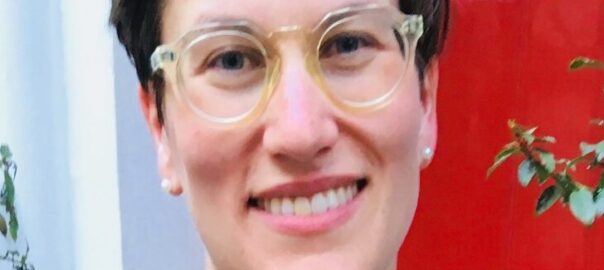
Darkness and Light
By Revd Dr Ayla Lepine
(2 of 3)
At this challenging time, as the Abrahamic faith communities approach a most sacred season in their annual calendars – Passover, Easter and Ramadan – lock down is depriving all of us of the opportunity to congregate in person. In that the virus at the centre of this global pandemic is not differentiating between religious affiliation, gender, race, or nationality, we see this as an opportunity to stand in solidarity with each other.
On this important occasion, we’ve asked two of our Mitzvah Day supporters to share with us the struggles their communities will face in celebrating Holy Week and observing Ramadan in the weeks ahead. We hope you find comfort in knowing that all of humanity are fighting the same cause and that religious leaders firmly believe that our prayers and support of each other will lead us forward with hope and inspiration.
Lent, Holy Week and Easter in the Time of Covid-19
By Revd Dr Ayla Lepine
There is a hymn often sung in churches called ‘There’s a wideness in God’s mercy’. God’s love, as one Christian prayer puts it, is ‘more than we can ask or imagine.’ Accessing that love and mercy is more important than ever, and feels quite difficult now.
The timing of the Covid-19 pandemic is a crisis for all, and for those whose faith traditions bring them into profound seasons of rituals and religious experiences in which being together has been essential, the timing creates unique anguish.
Lent is a 40-day season of fasting, repentance, study, and prayer, mirroring Jesus’ own 40 days in the wilderness expressing the truth of God’s love even though the challenges were profound. People tend to give things up or take things on. It begins with Ash Wednesday, during which people come to church to hear Psalm 51 (often sung to the beautiful setting by Allegri), receive the Eucharist, and also receive ashes on their foreheads in a cross shape.
The ash is made by burning palm crosses, given to the congregation and blessed on Palm Sunday, at the beginning of Holy Week. It reminds us that ‘you are dust and to dust you shall return; turn away from sin, and be faithful to Christ.’ We are only human. God is with us always.
Who could have imagined that within weeks we would have to be physically distant, close our churches, and worship online, to save lives, and love our neighbour as ourselves! The closures and the impossibility of gathering together in these holy places has caused heart breaking anguish.
We’ve suddenly become tech experts, in desperation, while traumatised, and at high speed. We cannot share the Eucharist either. Bread and wine cannot be offered together in our foundational way of gathering as a community.
On Palm Sunday, 5 April, congregations would normally be given blessed palm crosses, to symbolise the branches people laid down for Jesus when he arrived in Jerusalem on a donkey, knowing the time for his death and, eventually, his resurrection was drawing near.
This year we will make crosses on our palms and send photographs for an online Facebook Live service. When people hold up their palms, I will bless them remotely. Next year, I wonder what will be burnt instead, as a sign of this wilderness time. There is more creative thinking to be done!
The week that follows, Holy Week, is the most precious and sacred in the Church year. On Thursday, to remember the Last Supper, we will wash each other’s feet as a sign of Jesus’ humility, strip the altars of their sacred cloths, and pray through the night. On Good Friday, we meditate on the Crucifixion, drawing near to Jesus’ death. On Holy Saturday, there is a vigil late at night, in which a candle is lit from a fire and a prayer called the Exultet (‘Rejoice’ in Latin) is sung. In this ritual, light returns to a dark world, and life conquers death. Easter Sunday is always a time for joy.
Somehow, there will be joy this year too. We will have services online, we will meet for Zoom social and prayerful time, and we will help people in our community however we can. We are working with our neighbours of all faiths in Camden to support food banks, reach out to those who need practical and social support, and make new connections.
There is much good that will come from this situation, and lasting relationships too. But we will not gather to worship. No choirs, no handshakes, no hugs, no bread, no wine. There are no words for these immense losses.
But there is a ‘wideness in God’s mercy’. We cling to that now.
About the Author: Rev Dr Ayla Lepine is a curate priest ordained in 2019 working for Hampstead Parish Church. This reflection is in an Anglican context and in a personal capacity. She can be reached at: @heartchitecture / ayla@hampsteadparishchurch.org.uk
(Click here for Part 3)
Ramadan in Self-Isolation
By Liz Arif-Fear
(3 of 3)
At this challenging time, as the Abrahamic faith communities approach a most sacred season in their annual calendars – Passover, Easter and Ramadan – lock down is depriving all of us of the opportunity to congregate in person. In that the virus at the centre of this global pandemic is not differentiating between religious affiliation, gender, race, or nationality, we see this as an opportunity to stand in solidarity with each other.
On this important occasion, we’ve asked two of our Mitzvah Day supporters to share with us the struggles their communities will face in celebrating Holy Week and observing Ramadan in the weeks ahead. We hope you find comfort in knowing that all of humanity are fighting the same cause and that religious leaders firmly believe that our prayers and support of each other will lead us forward with hope and inspiration.
Four Ways to Embody the Fasting Spirit whatever your Faith
By Liz Arif-Fear
It’s been a strange few weeks into self-isolation at home amidst the Coronavirus pandemic. I for one am still receiving emails about cancelled events.
Yes… Welcome to lockdown!
Of course, for Jews, Christians and Muslims alike, things are going to get even stranger. With the current pandemic, Pesach (Passover), Easter and Ramadan are all going to be spent at home. We’re already into April and it’s now less than a month until Ramadan starts.
For Muslims across the globe, Ramadan is a special month when we fast from dawn to sunset, abstaining from food and water during daylight hours. Prescribed in the Qur’an, it’s a time to practice self-discipline, (re-)connect with our faith and to remember those less fortunate than ourselves.
This, of course, means it’s an important period for giving and doing charitable deeds.
As people look to help others and also connect with those around them, it’s also a very social period. Families, friends, neighbours and communities often get together for a communal Iftar – the name we give to the evening meal when we break our fast.
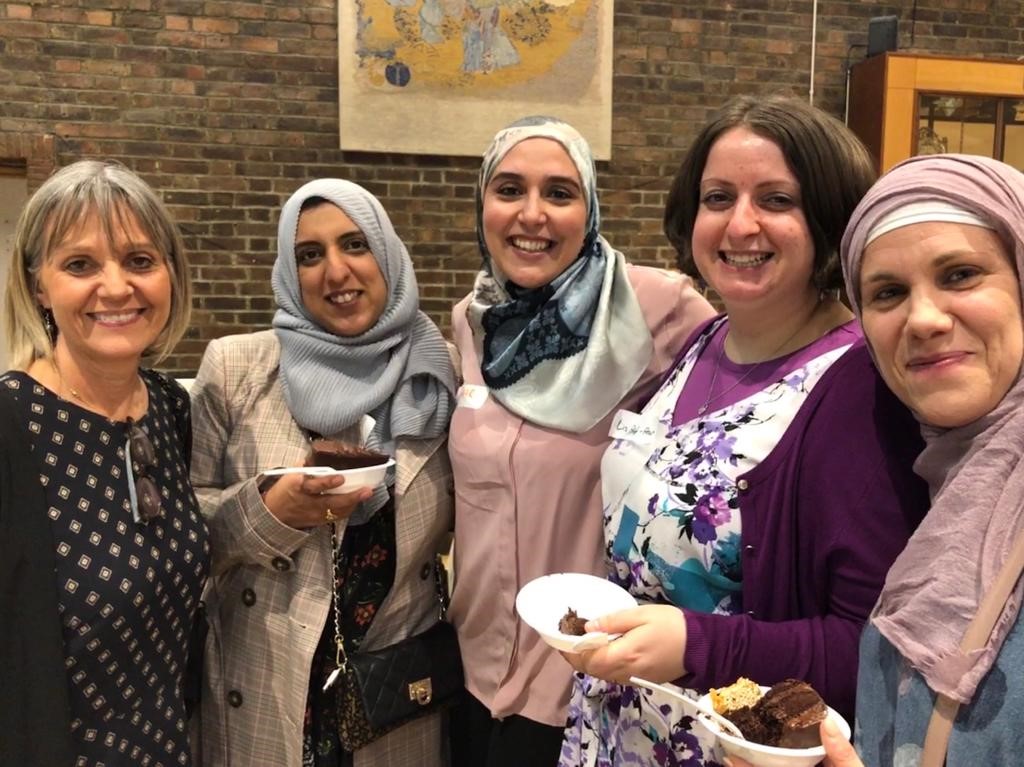 Image caption: Enjoying a lovely interfaith iftar at Alyth Synagogue with Jewish and Muslim sisters (Nisa-Nashim, 2019).
Image caption: Enjoying a lovely interfaith iftar at Alyth Synagogue with Jewish and Muslim sisters (Nisa-Nashim, 2019).
In a multifaith county such as the UK, Ramadan has become the perfect opportunity to engage in social action and for people of all faiths and none to come together.
Interfaith social action has become a big part of Ramadan and I love the increase in interfaith iftars every year! However, this year with the coronavirus pandemic, many of us will be asking:
What are our religious festivals going to look like? How will we make the most of Ramadan? And how can we reach out to others?
Whilst the idea of missing the daily commute whilst fasting sounds great… My beloved interfaith iftars at first seemed like a distant dream. Likewise, I’m sure many of you are wondering about what Ramadan in self-isolation will look like.
For non-Muslims too, with mosques, synagogues, churches and community centres closed and no interfaith iftars on the ground, you may also be unsure of how to enjoin in the Ramadan spirit. Well, don’t panic. All is not lost!
We can still have a wonderful Ramadan. Here’s how…
1. Worship at Home
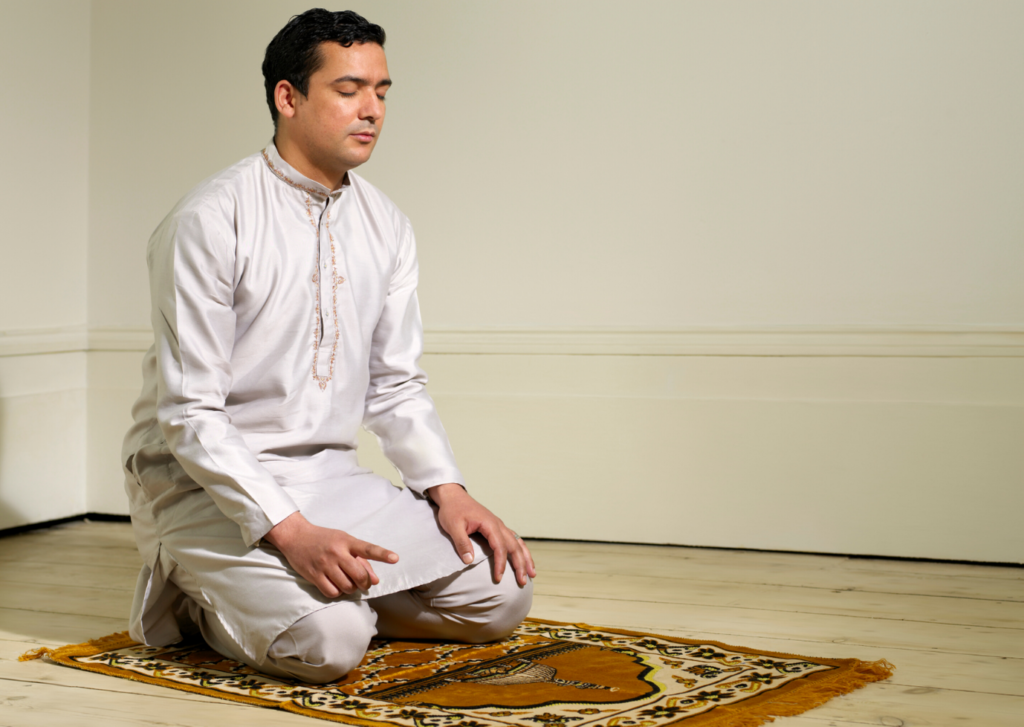
Ramadan is a time for spiritual reflection. Of course, whilst physically, collective worship is now limited to the members of your household, having a small group is still a positive.
So join in together! Pray together, read together and share this special time.
To solidify the bonds of interfaith friendship, why not also reach out to members of other faith communities?
You could for example set up an email or video-based (see more below) interfaith scriptural reasoning study club. Share reflections, traditions and learn about each other’s faiths.
If you live alone, you can also embrace this time of self-isolation to pause, focus on your spiritual needs and self-reflect. Why not write a diary and incorporate it into an interfaith blog for this holy Abrahamic period?
Yes, we may be physically alone, but we’ve still got God and each other. Plus a mountain of books, online articles and materials available for use!
2. Get E-social

Ramadan is a time to connect with others. Iftars with friends, family, colleagues and other faith communities offer an important opportunity to come together. And here’s the good news, despite the pandemic: we can still connect.
With Skype, Zoom and WhatsApp video calling, it’s now super-easy to stay in touch.
When I was working away from home, iftar calls connected with other Muslims. Likewise, I recently enjoyed an online interfaith Seder (Passover meal) with my lovely Jewish and Muslim sisters at Nisa-Nashim.
A picture from our online Interfaith Seder! It was just epic
#Seder #Passover #Bettertogether #ActiveAllies #Interfaith #Farbutnotfar
We’re now thinking about following up with online interfaith iftars this Ramadan. So, why not set up or join one too?
You can discover a host of faith groups via the Interfaith Network. If you’re looking to join, take a look at Eventbrite for online events and keep up-to-date through faith-based groups and pages via social media.
Remember: you can still socialise – it’ll just have to be at the tap of a keyboard!
3.Savour the Joy of Sadaqah

Ramadan is a month of fasting, self-discipline and reflection. And whatever our faith, we all know how important charity and recognising the needs of those less fortunate is. In Islam, the equivalent of a mitzvah (good deed) is called sadaqah. And this is a fundamental part of Ramadan.
Being at home thankfully doesn’t need to be an obstacle. In fact, during this current crisis, it’s more important than ever to look after each other. So, let’s come together and get in the spirit of interfaith social action.
You could help out by:
- Becoming an interfaith volunteer: Contact an organisation from another faith group such as Nishkam SWAT or the Jewish Volunteering Network to see what activities are possible
- Sending gifts: Surprise friends, neighbours and colleagues with a little pick-me-up
- Registering for the NHS’ volunteer service: Help vulnerable people by delivering food and medicines or calling up someone who’s feeling lonely
There’s plenty of opportunities to partake in sadaqah. So, share the Ramadan spirit!
4. Give Thanks and Have Patience
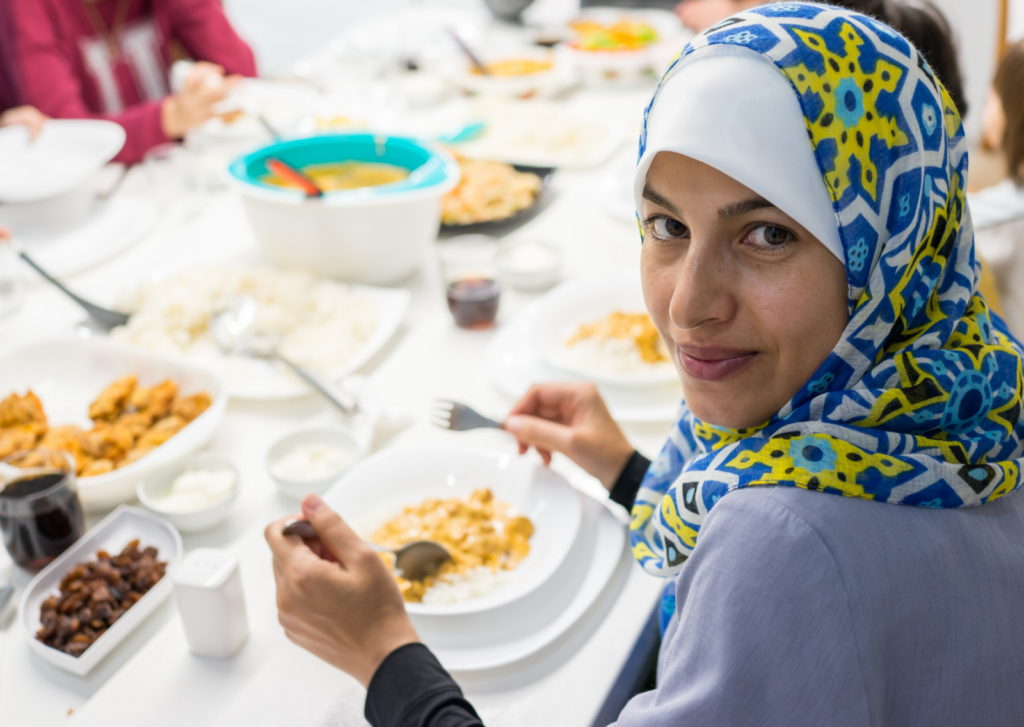
Ultimately, whilst the current circumstances may not be ideal, we need to look at the larger picture. For many of us at home, we’re safe, happy and healthy – plus we have food on the table to open and break our fasts, enjoin in an Easter meal and hold our own Seders.
In times like these which test our patience, let’s remember our blessings.
For those affected financially by the crisis, who are socially isolated and of course may be ill and/or otherwise affected by the virus, times are incredibly hard. So let’s be thankful for our health and think about those around us – here at home and all over the world – who remain vulnerable.
There’s still plenty to be positive about and Ramadan isn’t going anywhere.
Ramadan Mubarak, Chag Pesach Sameach and Happy Easter!
Have a blessed Ramadan, a meaningful Passover and fantastic Easter!
About the author
Liz Arif-Fear is a British Muslim and writer and campaigner passionate about human rights and interfaith issues, in particular Jewish-Muslim relations. She is Founder and Director of Voice of Salam and tweets at @Voice_of_Salam.
Our shared Jewish and Muslim calling to go green
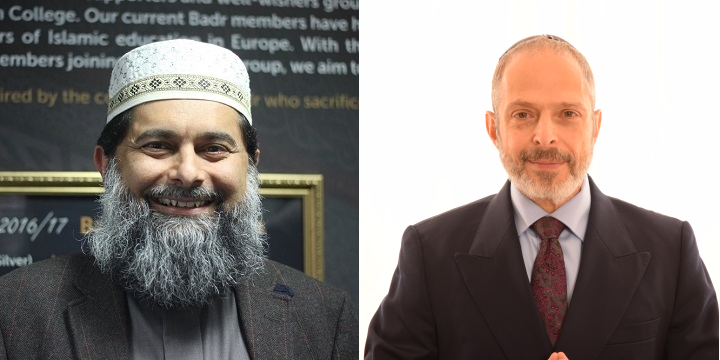
Published on www.mitzvahday.org.uk
To mark Inter Faith Week and ahead of Mitzvah Day – which this year has a green theme – religious leaders from five different faiths will be addressing the dire ecological crisis we face across the globe, drawing on scripture in their calls for urgent action.
In our first piece, which also appears in this week’s Jewish Telegraph, Rabbi Jeff Berger and Shaykh Ibrahim Mogra give the Jewish and Muslim point of view:
The earth, according to both Jewish and Muslim traditions, was created by G-d and entrusted to humanity. A single guardian couple, Adam & Eve, has now expanded to more than 7.8 billion people. The dynamics have changed dramatically, but we are at risk of destroying the very habitat that supports our human life.
There are few things that can impact all of humanity – regardless of race, religion, culture or ethnicity – as much as ecological collapse.
In the Genesis story of Creation (Chap 1:28), man and woman, while still in the Garden of Eden, are commanded to be Fruitful and Multiply. But in the re-telling of the story (Chap 2:15), the first man is charged to Serve and Preserve the Garden.
The Jewish cycle of festivals is built around an agricultural calendar. Our weekly cessation of labour, on the Sabbath, benefits humans and livestock alike.
In the Torah, G-d tells Moses to instruct the people to treat the environment with care. Landowners are annually obliged to share their bountiful harvests with the poor, widow, orphan and stranger – the dispossessed, so that they too are looked after. They also must let their fields rest every 7th and 50th years. Separately, the Torah commands us not to unnecessarily destroy nature.
In the later interpretive writings of the rabbinic period, we have wonderfully rich passages charging us to maintain G-d’s work, the earth, for “if you destroy it, there’s no one to repair it after you.”
We also have the 1st century BCE story of Honi the Circle Maker who saw a man planting a carob tree which would take 70 years to reach maturity. He asked if the man expected to live so long to see it bear fruit and was told “just as I found trees my ancestors planted, so this is being planted for generations to follow.”
The carob tree planter’s story resonates with the words of the Prophet Muhammad (peace be upon him). He said: “No Muslim plants a tree or sows seeds and then a bird, or a human, or an animal eats from it but that it is a charity for him.”
He also strongly emphasised the importance of planting trees, saying: “If the Day of Judgement were upon one of you and he has a sapling in his hand, then let him plant it.”
The Qur’an says that the human being is G_d’s steward on earth and has been given dominion over the creation. Every human being is a trustee of this fragile planet. The duty and responsibility of this trustee is to preserve and protect it for us and for future generations, and not to dominate and destroy it.
Perhaps the best way to express the relationship between human beings and the planet is that we are in a position of stewardship to Nature.
So what can we do?
First, learn more. Understand where the harmful impacts are coming from and how to reduce them.
Second, let’s stop ignoring or denying the severity of the problems.
Third, let’s begin an honest assessment of our conduct to see where we can make possible changes.
And fourth, let’s encourage our communal institutions to also act more responsibly.
Left as is, the trajectory of our decisions and consumption patterns will accomplish the opposite of the generation of Honi the Circle Maker.
We will be negligent in our duties of stewardship for this magnificent planet with which the Almighty has graced us, and little or nothing will remain for our descendants.
As faith leaders, we believe it is our responsibility to share a message of great concern and to promote a movement for increased awareness and responsibility.
Please join us, on Mitzvah Day and every day, in helping to change our habits.
A New Year – A New Challenge
Published on www.mitzvahday.org.uk
My two strongest childhood memories of Rosh Hashanah are the amazing food at family meals and going to synagogue with my father to hear the Shofar. What are yours?
For some of us, eating certain foods during the Jewish festivals evokes early memories that formed part of our Jewish identity. My Russian-born diminutive aunt would sequester all the women in the family in her home for 3 days of cooking in anticipation of Rosh Hashanah. The meals themselves remain in my memory as times of great family togetherness and much fun for the children.
*****
On Rosh Hashanah, Jews are obliged according to the Torah to mark the New Year as Yom Teruah (A Day of Sounding Out) and Yom Zikhron Teruah (A Day of Remembering to Sound Out). Our Mahzors list 10 things we should contemplate when listening to the Shofar – among them are G-d’s Majesty, the Creation of the World, the Binding of Isaac, the 10 Commandments and more. The big stuff!
Rabbi David Fohrman from Aleph Beta looks in the Torah for references to Shofar and finds a connection with our national collective experience at Mt Sinai. He suggests that the verse ‘and the sound of the Shofar grew louder’ (Ex. 19:19) shouldn’t be taken literally – that there wasn’t anyone physically blowing a Shofar.
Instead, he believes, the initial sound of G-d’s revelation to Moses began as a Teruah and eventually coalesced into the words that formed the 10 Commandments. So, in listening to Shofar, we’re reminding ourselves of Sinai and of the spiritual sound of being in the Almighty’s presence.
Another Torah reference to hearing a Heavenly Voice goes back even further, to the Garden of Eden, when after eating from the Tree of Knowledge of Good & Evil, Adam and Eve hear the primordial voice of G-d ‘strolling in the Garden’ (Gen. 3:8). Rather than rejoicing with the Almighty, the first couple are said to have hidden, leading G-d to ask the question ‘Where are you?’
The rabbis of the Talmud write that by blowing the Shofar on Rosh Hashanah we ‘confuse the Satan’ who is waiting to accuse us before G-d for our shortcomings. We might ask, ‘Is the Satan so foolish to fall for the same trick every year or do we simply not understand the deeper meaning of this text?’
One approach is to recognise that the confusion is inside of us. Throughout the year some of us go about our lives thinking little about our souls and much more about our mortal existence. The sound of the Shofar confuses that little unhelpful voice inside each of us that always ‘finds excuses why not to do something in our best interest’.
Waking early in the morning to spend a few moments in meditation and prayer or being generous to others who are in need of the things we already have an abundance of, seems relatively simple, but so often just doesn’t happen. We’re trained to be self-centred from a young age.
The Shofar in the Book of Joshua was also used as a clarion call to gather troops together before going to battle, especially outside the walls of Jericho. This year’s Mitzvah Day theme calls our attention to the challenge for each of us to do better in looking after the ecology of our planet.
In case you haven’t chosen yet, please have another look at our available projects website for some amazing opportunities; including Gratitude’s gardening project in Hertfordshire, the JVS gardening project in Golders Green or helping at the Spitalfields City Farm. There are numerous crafts (Jewish Care, Haven House), cooking (Feast) and collection (Camp Simcha, Lord’s Taveners, Bike Project) opportunities as well as projects in hospices, for the homeless and with refugees. Now is a good time to decide.
*****
Fortunately, my wife learned some of our family recipes from my aunt before she passed away and has added some delicious ones of her own. And, for the last decade I’ve been privileged to take our children to hear the Shofar at synagogue.
The Shofar blast stirs us to check our complacencies, to examine the year that’s gone by and to ask ourselves in relation to G-d’s presence ‘Where am I?’
What answer will we give this year?
Wishing you Shanah Tovah & Tizku LeShanim Rabot,
Rabbi Jeff Berger
Addicted to Hatred – 4 September 2018
4 SEPTEMBER 2018 – JEWISH NEWS/ TIMES OF ISRAEL BLOG
Addicted to hatred

With only a week until Rosh Hashana, many of us will be reflecting on the past year and looking forward to what lies ahead.
In our family, we were fortunate to survive this year’s GCSE exams and to visit American relatives in August who introduced us to the popular Netflix series FAUDA. Created, written and produced in Israel and based on real-life experience, this award winning drama which debuted in 2015 has run through 2 seasons, with a 3rd series expected in 2019.
A gripping drama about an Israeli counter-intelligence unit operating in Gaza, it grabs its audience from the first instance. Nearly every scene is driven by blind rage, violence and seething hatred. The remainder is filled with immorality and lawlessness – a perfect formula to appeal to today’s mass audiences.
One can see why this kind of entertainment is addictive. Anger and rage are the new caffeine in our diets – not just on TV but in so many places; on social media, on university campuses and in what used to be civil society. In politics this trend is not just in Hungary and Poland, but in the USA and the UK.
Look around and you’ll see how easy it is to be drawn to this dark side and to observe the social trauma it can cause. But you’ll say, surely there are those who ‘deserve’ our hatred. Perhaps yes, but as Yoda, from Star Wars warned,
“Fear is the path to the dark side. Fear leads to anger. Anger leads to hate. Hate leads to suffering.”
Readers are probably familiar with the famous quotation attributed to an anonymous monk from the 11th century, repackaged in 1961 in simpler language and attributed to Aldous Huxley:
“As a young man, I wanted to change the world. I found it was difficult to change, so I tried to change my nation. When I found it impossible to change the nation, I began to focus on my town. Failing even this task, and as a mature person, I tried to change my family, Now much older, I realise the only thing I can change is myself.”
When we examine the emotional ebbs and peaks in our daily lives, we can see from where we get our energy. Our passions often are the source for our greatest enthusiasm, fulfilment and joy.
How sad then to see so much energy being wasted on stereotyping, prejudice, bigotry, anger and resentment. This can even be found inside our houses of worship, where intolerance and impatience can come to the fore, when acceptance of differences would be more appropriate.
All the while, those most upset insist that others are the source of their unhappiness and displeasure. If only ‘they’ would be like ‘us’, life would be much more predictable and satisfying.
Sadly, in this digital age we’ve almost entirely lost the ability to dialogue; to recognise different views and to acknowledge them with respect and understanding. Instead, we adopt uncompromising platforms, and when we meet those who disagree with our ‘narrative’, the result is shouting and aggression.
Many of us, though familiar with the first part of the monk’s parable quoted above, are unfamiliar with its conclusion.
“Suddenly I realized that if long ago I had changed myself, I could have made an impact on my family. My family and I could have made an impact on our town. Their impact could have changed the nation and I could indeed have changed the world.”
It’s not too late.
Perhaps, this week before Rosh Hashana – and days before the UN-designated International Day of Peace – we can strive to let go of our hatreds and fears. To do so only requires a quiet mind, reflecting within to identify where we can better expend our emotional energy, and then consciously moderating our thoughts and tempering our behaviour.
When we hear the Shofar welcoming New Year 5779, let’s do so from a new place – an internal space of resilience and calm, appreciating that all of us are created in G-d’s image. Finding holiness first in ourselves, we should then be able to recognise it in those who are different from us.
May we merit a year filled with G-d’s blessings, and with the goodness we choose to bestow upon ourselves and upon each other!
Tizku LeShanim Rabot/ Shanah Tobah
Jews Must Stand Up When Muslims are Being Targeted – 13 August 2018
13 AUGUST – JEWISH NEWS/ TIMES OF ISRAEL BLOG
Jews Must Stand Up When Muslims are Being Targeted
On our summer beach holidays along the boardwalk promenade where people strolled throughout the day but especially in the evening when the temperatures were cooler, there were caricature artists sitting on folding chairs in front of their A1-sized easels with charcoal and pastel pencils ready to hand. They were waiting to draw quick sketches with exaggerated features of any tourists willing to part with the equivalent of about 10 quid.
Over the years on more than one occasion I stopped for the requisite 5-10 minutes that it took for the sketch to be drawn. The successful artists were clever and had lots of custom. Watching their handiwork come to life, I could see something of a humorous superficial likeness but which lacked subtlety or nuance.
There’s been so much written and spoken this past week about the former Foreign Secretary Boris Johnson’s article in the Telegraph that compared women wearing a niqab or burka to letter boxes and bank robbers. Like those summer holiday artists, caricaturing a small number of Muslim women who choose to wear overtly modest clothing seemed to lack nuance and tact.
Last Friday I had the privilege as an Orthodox rabbi to visit a North London mosque where the Imam spoke at length about the hurt and outrage this stereotyping caused within the Anglo-Muslim community. Sitting on the floor with more than 400 worshippers, I too felt a great sense of sadness and upset.
That someone in high office who is a potential candidate for prime minister would offend more than 5% of the population, some of whose ancestors have lived here for more than a century, defies belief. Sitting next to and around me were hard-working people from the professions and from the civil services, people who contribute through their taxes and through their charitable works to the betterment of their neighbourhood and beyond.
During the Imam’s sermon he mentioned the need to stand up against Islamophobia, anti-Semitism and all forms of hatred that regrettably are much more commonly expressed in public now than any time in the last 2 decades. From the article, I wasn’t entirely convinced Mr Johnson’s reference was deliberately Islam phobic but it was perceived that way by the Muslims I spoke with.
It also made me wonder how my community would feel if someone made fun of the way we dress. Orthodox Jewish men and women also have a code of modesty that affects what we wear. Admittedly, we’ve gotten used to poking fun at ourselves. But coming from an outsider, we tend more often to bristle.
Just as Jews find it offensive when anti-Semitism occurs in the Labour Party, one must confront other forms of bigotry in the Tory Party. It’s hard to sit quietly and watch the hurt and pain caused to Muslim friends who want, like all the rest of us, simply to raise their children and aspire to the benefits of a tolerant, multi-cultural British society, yet find themselves uncomfortably ridiculed because of outward appearances.
We’re all in this together. If we want sympathy in fighting anti-Semitism, surely we must do the same when we see insensitivity and injustice, especially if that results in hatred being directed at others.
The Prophet Micah (6:8) asked rhetorically, ‘Oh Mankind, what is good and what does the Lord seek from you?’ To be just, to love mercy and to walk humbly with your God.’
To me that verse suggests that to find real balance, it’s not enough to think we’re right, or even to be merciful, but that our actions must always pass the litmus test of whether we have sufficient humility towards others and before God.

